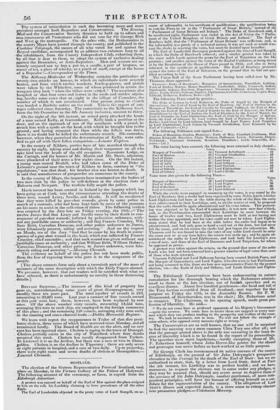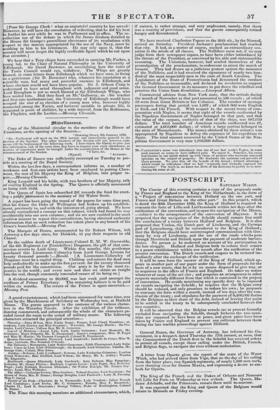SCOTLAND.
The election of the Sixteen Representative Peers of Scotland, took : place on Monday, in the Picture Gallery of the Palace of Holyrood.
• The following account of the ceremony, or farce, is copied from the ,.Edinburgh Advertiser.
A.protest was entered on behalf of the Earl of Mar against the place assigned to hun on the roll, his Loydship claiming to have precedence of all the other Earls.
The Earl of Lauderdale objected to the proxy votes of Lord Sempill, on ac- count of informality in his certificate of qualification ; the. qualification being to vote for Peers to sit in the " Parliament of Great Britain," instoad'of the " Parliament of Great Britain and Ireland." The Duke of Buccleuch said, if he recollected right, Parliament was styled in the Act of Union the " Parlia- ment of the United Kingdom of Great Britain and Ireland." The Earl, of Rosebery held, that the "Parliament of Great Britain" was sufficient, and, as the informality was purely of a technical nature it was not such as would war- rant the clerks in rejecting the votes, but must be decided upon hereafter. The Earl of Latulerdale thereupon protested against the votes of Lord Sempill, to which the Duke of Buccleuch adhered; and a similar protest was taken by • the same noble Lords against the proxy for the Earl of Torpichen on the like grounds ; and another against the votes of the Earl of Caithness, as hieing struck at by the Resolution of the House of Peers passed in 1822, and also as being informal in the certificate of qualification. The Earl of Rosebery protested against the votes of the Earl of Balcarras, on the ground that he had not qua. lified according to law. The Union Roll of the Scots Parliament having been called over by Mr. Thomson, there appeared- PRESENT—Duke of Bueeleuelt ; Marquises of Queensberry, Tweerldale, Lothian ; Earls of Rothes, Morton, Home, Strathmore, Lauderdale, Airly, Cantwath, Selkirk, Dundotiald, Orkney, Rusebery, llopetutin :, Viscounts Falkland, Arbutlinott, Strath. allan ; Lords, Forbes,Salioub, Sinclair, Elphinstune,Colville, Craustuuu, Napier, Reay, Elibank, Belhaven, It taliven, Rollo.—(31.) The following Peers voted by proxies— The Duke of Lennox by Lord Belhaven, the Duke of Argyll by the Marquis of Queensberry. the Earl of Errol by the Earl of Rosebery, the Earl of Buchan by the Marquis of 'Twee:141,1e, the Earl of Cassilis by Viscount Falkland, the Earl of Aber. corn by the Earl of Morton, the Earl of Kintore by the Earl of Rusebery, the Earl of Breadalbane by the Earl of Bathes, the Earl of Aberdeen by the Earl of Murton, the Earl of Dunmore by Lord Elphinstone, the Earl of Stair by the Marquis of Queens- berry, the Earl of iilasgow by Lord Forbes, the Earl or Portmure by the Earl of Rothes Lord ; ray by Lord Saltoun, Lord Sempill by Lord Napier, Lord Torpichen by Lora Elphinstoue, Lord Nairne by Viscount Strathallan, Lord Kiunaird by the Earl of Carnwath.—(18.) The following Noblemen sent signed lists—
Dukes of Hamilton. Gordon. Montrose ; Earls of Mar, Craufurd. Caithness. Had.
dington, Kinnoull, Dumfries, Elgin, Wemyss,
Newburgh ; Viscounts Stormont, Kenmure, rester.—(21.) The votes having been counted, the following Votes.
Marquis of Tweeddale Vo44 Earl or Morton 53
Earl of home 43 Earl of Elgin 47 Earl of Airly 39
Earl of Leven 40 Earl of Selkirk 43
Earl of Orkney v(37,ti.s.
Votes were also given for the following
Dalhousie, Leven, Balcarras, Aboyne, Dunblitne ; Lords Somerville, For-
were returned as duly elected—
Votes.
Viscount Arbuthnott 42' Viscount Strathallan 43 Lord Forbes Lord Gray 41. 53 Lord Saltoun 52
Lord Sinclair 42,
Lord Elphinstoue 37 Lord Colville 43
Peers—
Votes.
Marquis of Queensberry 36 Lord Cranston 31
Earl or Rothes 31 Lord Napier 36
Earl of Buchan 22 Lord Reny 36
Earl of Carnwath 31 Lord Elibunk aa While the clerks were engaged in slimming up the votes, it was stated by the Earl of Rosebery that a doubt had been expressed by some Noble Lords whether Lord Elphinstone had been at the table during the whole of the time the oaths were administered to their Lordships, and, to set the matter at rest, he proposed that the oaths should bargain administered and his votes taken. This proceed- in. was objected to by the Earl Of Lauderdale ; it was now near four o'clock,
;ad, as the Proclamation commanded their Lordships to meet between the hours or twelve aud two, Lord Elphiustone must be held as not having met
within the time appointed, and his votes could not now be taken. Lord Elphin-
stone stated that he had been at the table before the oaths had begun to be administered, and had only gone to hand a card out at the door, but had never
left the room, and or, his return the clerks had just begun the solemnities. Mr. Thomson said he was bound to take the votes of any noble Lord should he enter the room now or at any time before the return was made up ; and he again ad- ministered the oaths to Lord Elphinstone, and took both his Lorship's own votes of new, and those of the Earl of Dunmore and Lord Torpichen, for whom he appeared as proxy. A protest was taken against the return, on the ground that some of the noble Lords who lead not been returned had a greater number of legal votes than some of those who were returned.
Viscount Falkland and Lord Belhaven having been created British Peers, and the Marquis of Queensberry and Lord Napier, who also were in last Parliament, not being returned to this, there are four new representative Peers by the present election, viz.—the Earls of Airly and Orkney, and Lords Sinclair and Elphin- stone.
The Edinburgh Conservatives have been endeavouring to extract consolation for the thorough beating which the Reformers adminis- tered to them at the late election, out of foolish speeches and an excellent dinner. About five hundred gentlemen—the head and tail of the Tory faction assembled from all Scotland—met together for that
purpose on Friday the 11th, in the Assembly Rooms. Sir F. W. Drummond, of Hawthornden, was in the chair ; Mr. Robertson acted as croupier. The Chairman, in his opening speech, made great pro- fession of liberality. He said—.
" We do not come here as professed opponents of his Majesty's Government —quite the reverse. We come here to tender them our support in every mea- sure which they can produce tending to the prosperity and welfare of the coun- try. We look to measures, not to men. We will not follow the example of , some others, who opposed every measure right or wrong."
The Conservatives are so well known, that no one will be surprised to find the meeting was a mere common Ultra Tory one after all; and
that the passage quoted above is the only one savouring in the least de- gree of liberality which is to be found in the report of its proceedings. The speeches were most lugubrious,—hardly excepting those of Mr. P. Robertson himself, whose John. Reeve-likegenius for the absurd and grotesque was never before so hard-worked to so little purpose.
Sir George Clerk has recommenced in active canvass of the county of Edinburgh, on the ground of Sir John Dalrymple's prospective elevation to the Peerage by the death of the Earl of Stair : but we are authorized to state, that, by a letter from Lord Stair, dated at Paris the 5th instant, his Lordship- was in perfect health; and we have, moreover, to request the electors not to come under any pledges, as they may be assured that, should any event occur to deprive them of the services of Sir John Dalrymple, another gentleman, of most inde- pendent principles, will have the honour of offering himself as-a can- didate for the representation of the county. The allegation of Lord Stair's illness and expected death, is a mere snare ta entrap electors into premature pledges.-- Caledonian Mercury.
[Poor Sir George Clerk ! what an ungrateful country he has served ! However, he will have the consolation of reflecting, that he did his best to feather his nest while he was in Parliament and in office. The re- collection too of the debate in which Sir James Graham detailed to the House Sir George's punctihous observance of its resolutions with respect to the monies appropriated for the use of the Navy, must be soothing to him in his retirement. He may rely upon it, that the country will never forget the highly creditable figure which he cut upon that occasion.]
We hear that a Tory clique have succeeded in carrying Mr. Forbes, a young lad, to the Chair of Natural Philosophy in the University of Edinburgh. Sir David Brewster, on ascertaining how the votes of the Town Council would run, withdrew. The Whigs are greatly blamed, in some letters from Edinburgh which we have seen, in fixing on a gentleman (Sir D. Brewster) who, whatever his reputation as a scientific man, had many and powerful enemies in Edinburgh, and whose election would not have been popular. Sir J. Gibson Craig is understood to have acted throughout with judgment and good sense. Lord Brougham is not so much blamed as the Edinburgh Whigs, who have misled him. Had they fixed on Mr. Galloway, an r-ble teacher and first-rate mathematician, the University of Edinburgh would have escaped the slur of an election of a young man who, however highly connected among the Tories, and however amiable in private life, is separated in point of abilities, by a wide interval, from the Robinsons, the Playfairs, and the Leslies.—Monting Chronicle.

















 Previous page
Previous page